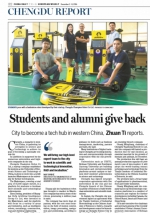《中国日报》(CHINA DAILY)报道我校众创空间和学生创业团队
12月2日,《中国日报》欧洲版第32版刊发整版专题报道,聚焦成都西部科技中心建设。其中,题为"Students and alumni give back"的文章重点介绍了电子科技大学“众创空间”正式启用,推动学生创新创业工作的情况,以及成都与各大高校、科研院所合作共谋发展的最新成果,体现了成都建设国家中心城市的科技实力。
文章反映出成都正通过将自身打造成为西部科技中心,助力实现国家中心城市的新目标。成都众多高校和高新技术企业将为这一目标提供重要支撑。成都电科创品机器人科技有限公司即将入驻电子科技大学启用的“众创空间”。今年4月李克强总理在川考察期间,曾应邀与该公司设计的机器人对打羽毛球。成都已分别与5所在蓉高校,以及中科院成都分院签署战略合作协议,共建世界一流高校和科研院所。报道内容如下:
Chengdu, a megacity in western China, is gathering its strengths in science and technology to achieve its goal of becoming a nationally central city.
Its ambition is supported by the numerous universities and high-tech companies in the city.
Chengdu Champion Robot Co Ltd, a startup company established by students at the University of Electronic Science and Technology of China, is about to move into a newly launched Makerspace at the university for further development.
The Makerspace, covering a total area of 16,000 square meters, is a platform for students to incubate their scientific and technological achievements.
Zhou Jinting, president of Shanghai Hefu Artificial Intelligence Group Co Ltd, who invested in the Makerspace, said the platform will focus on a variety of areas and industries, such as intelligent robots, metallurgy, construction, coal and chemical engineering.
Huang Shan, CEO of Champion Robot, said her company had received a 5 million yuan ($726,333) angel investment from Hefu Artificial Intelligence Group, and it expects to raise 20 million yuan of investment in the first round of financing.
During his visit to Chengdu in April, Premier Li Keqiang played badminton with a robot designed by the company.
Huang said the badminton robot was brought to market in March. Her company has sold a dozen of the robots, generating 4 million yuan in sales.
The company has more than 40 patents, with the core ones focusing on the field of motion control, vision, image processing, navigation and positioning, according to Huang.
She said her company is planning to apply the technology to a wider area and develop more robot products with different functions.
"Moving into the Makerspace will save costs and help us to bring new products to the market," she said.
The university has established an institute of innovation and entrepreneurship to provide students who are starting a business with guidance in fields such as business management, marketing, patents and laws, she said.
Many institutions of higher learning in Chengdu are boosting innovation and entrepreneurship through cooperation with the city government.
Universities such as UESTC, Sichuan University and Southwest Jiaotong University are building innovation and entrepreneurship platforms around campus to harness their students' achievements in science and technology.
Chengdu has signed strategic cooperation agreements with five universities in the city and the Chengdu branch of the Chinese Academy of Sciences to build world-class universities and scientific institutions.
In August, the Chengdu city government signed an agreement with the Tianjin Institute of Industrial Biotechnology at the Chinese Academy of Sciences to build a research and development center for biotechnology at Chengdu Science City in Chengdu Tianfu New Area, a national-level new area.
"We don't merely bring our technologies to Chengdu," said Ma Yanhe, director of the institute. "We will bring our high-level expert team to the city to work in scientific and technological innovation, R&D and incubation."
Previously, the institute transferred some patent technologies to Chengdu Yuanhong Biotech Co Ltd, an emerging biotech company.
Huang Mingliang, chairman of Chengdu Yuanhong Biotech Co Ltd, said the company will launch a production line for myo-inositol, an essential material for the growth of humans and animals, in December.
The production line will have an annual production capacity of 5,000 metric tons of myo-inositol. It will adopt the world-leading extract techniques and technology from the Tianjin Institute of Industrial Biotechnology at the Chinese Academy of Sciences, he said.
The products have a broad range of applications in pharmaceutical, food and fodder industries.
Huang Mingliang said the company has set up biotechnology cooperation platforms in a number of countries and regions for further development, including Canada, the United States, Israel and France and Hong Kong.
He is also executive vice-chairman and secretary-general of the recently established Global Alumni Entrepreneurs Association of Sichuan University.
He said the association will gather and integrate global sources in the biopharmaceutical field through the influence of the university and its alumni entrepreneurs, so as to boost international cooperation and help to develop the biological industries in Chengdu.
报道链接:
http://europe.chinadaily.com.cn/epaper/2016-12/02/content_27545461.htm

